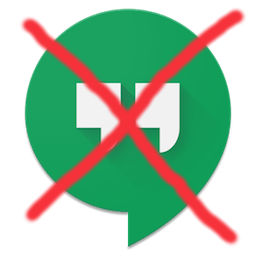We’re going to pretend like we’re AM disc jockeys from the golden days of top 40 radio and countdown the top nine stories that appeared on FOSS Force last year. Along the way, we’ll offer a bit of commentary, and maybe remind you a time or two that things were much different way back in 2015.
Posts tagged as “Google”
Like it or not, Google’s open source WebP image format is here to stay. At this point, the only thing holding back widespread adoption on the Internet is browser support. At present, the format is supported in Chrome, Opera, Opera Mini, Android Browser and Chrome for Android. However, with the folks at Mozilla working fast and furious to improve the Firefox experience in hopes of giving Chrome some competition, you can bet that Firefox support for WebP will be coming soon. When that happens, the two other major holdouts, Internet Explorer (now Microsoft Edge) and Safari, will be sure to follow suit.
 When all browsers are on board, it’s certain that high traffic websites will adopt WebP as their graphics format of choice. Google is already converting most if not all graphics uploaded to Google+ to WebP to deliver to browsers supporting the format.
When all browsers are on board, it’s certain that high traffic websites will adopt WebP as their graphics format of choice. Google is already converting most if not all graphics uploaded to Google+ to WebP to deliver to browsers supporting the format.
Christine Hall has been a journalist since 1971. In 2001, she began writing a weekly consumer computer column and started covering Linux and FOSS in 2002 after making the switch to GNU/Linux. Follow her on Twitter: @BrideOfLinux
Google is getting ready to migrate all Gmail users to Inbox, which should be something of a concern for those worried about privacy, but no one seems to be noticing. The current efforts seem to be directed at users of the Gmail mobile app, but it’s my guess that desktop users of Gmail will be getting be getting the same treatment soon.
 Except for those using a free version of Android such as Replicant, and who install apps from free and open software sources such as F-Droid or Fossdroid, the protection of privacy on mobile devices, by design, is hopeless. Users have come to accept that most apps from Google’s store demand a whole slew of privileges whether they need them or not, and even when not being used, many apps happily go about the business of collecting and reporting everything they’re permitted to find out about us.
Except for those using a free version of Android such as Replicant, and who install apps from free and open software sources such as F-Droid or Fossdroid, the protection of privacy on mobile devices, by design, is hopeless. Users have come to accept that most apps from Google’s store demand a whole slew of privileges whether they need them or not, and even when not being used, many apps happily go about the business of collecting and reporting everything they’re permitted to find out about us.
Christine Hall has been a journalist since 1971. In 2001, she began writing a weekly consumer computer column and started covering Linux and FOSS in 2002 after making the switch to GNU/Linux. Follow her on Twitter: @BrideOfLinux

“Microsoft and Google are pleased to announce an agreement on patent issues,” Redmond has said in a joint statement with Google. “As part of the agreement, the companies will dismiss all pending patent infringement litigation between them, including cases related to Motorola Mobility.”
Christine Hall has been a journalist since 1971. In 2001, she began writing a weekly consumer computer column and started covering Linux and FOSS in 2002 after making the switch to GNU/Linux. Follow her on Twitter: @BrideOfLinux
Way back when, before Google got into the software biz with stuff like Android and Chrome, Firefox cut a deal with the ad-agency-masquerading-as-a-search-engine which probably made Mozilla’s browser the most well funded open source project outside of Linux. The deal — simply to make Google the default search engine in Firefox — was a no brainer, not only for Google and Mozilla but also for the browser’s user base, as most users would most likely choose Google anyway, since Google then, like today, was overwhelmingly the most used search engine in the solar system.
 The deal created a river of money flowing into Mozilla’s coffers — $138 million in 2011 alone — allowing rapid development of Firefox, proper maintenance of Thunderbird and Bugzilla, and the creation of Firefox OS. Although there was a bit of grumbling from some FOSSers who would’ve preferred a default search engine that was more respectful of user privacy rights, the deal was generally seen as a good thing for the free and open source community.
The deal created a river of money flowing into Mozilla’s coffers — $138 million in 2011 alone — allowing rapid development of Firefox, proper maintenance of Thunderbird and Bugzilla, and the creation of Firefox OS. Although there was a bit of grumbling from some FOSSers who would’ve preferred a default search engine that was more respectful of user privacy rights, the deal was generally seen as a good thing for the free and open source community.
Christine Hall has been a journalist since 1971. In 2001, she began writing a weekly consumer computer column and started covering Linux and FOSS in 2002 after making the switch to GNU/Linux. Follow her on Twitter: @BrideOfLinux
“That hat’s going to get you labeled as a malcontent”.
I was standing in line at the local supermarket when a lady behind me expressed her opinion on my choice of head wear.
I turned and smiled. “Excuse me?”
She smiled and jerked her head up, glancing at the hat I was wearing. “Your Linux hat. That will probably land you on a no fly list. Maybe worse.”
 We had passed each other while shopping earlier and had exchanged nods and smiles. I had to laugh. She didn’t flinch when I put the robo-Ken device to my throat to talk to her.
We had passed each other while shopping earlier and had exchanged nods and smiles. I had to laugh. She didn’t flinch when I put the robo-Ken device to my throat to talk to her.
Ken Starks is the founder of the Helios Project and Reglue, which for 20 years provided refurbished older computers running Linux to disadvantaged school kids, as well as providing digital help for senior citizens, in the Austin, Texas area. He was a columnist for FOSS Force from 2013-2016, and remains part of our family. Follow him on Twitter: @Reglue
Before Google, search engines didn’t get in the way too much.
This isn’t necessarily Google’s fault. There were a lot fewer websites then, and also many fewer people looking for them. Even then, however, unscrupulous web designers were working overtime to scam the system in an effort to gain ranking — which is why search engines now only pay scant attention to the “keyword” meta tag, which is so often stuffed with keyword spam that it’s not to be trusted.
Obviously, search engine ranking is important because it’s one of the main ways people find a site. People can’t read content they can’t find. And if nobody finds a site’s content to read it, what’s the use of writing it? So getting an article off of page twenty in a search result and onto page one is key — which is why you read so much about SEO, or “search engine optimization.”
SEO is basically giving Google what Google wants, for the purpose of improving the chances of getting a page to the top of a search list. For content sites, SEO can be sort of a deal with the devil, as writers who pay too much attention to “best SEO practices” will find that doing so will effect the quality of their writing.
Christine Hall has been a journalist since 1971. In 2001, she began writing a weekly consumer computer column and started covering Linux and FOSS in 2002 after making the switch to GNU/Linux. Follow her on Twitter: @BrideOfLinux



 First things first: I know that the wide number of variants in the BSD family are primarily aimed at servers. That said, it’s clearly understandable that with the exception of
First things first: I know that the wide number of variants in the BSD family are primarily aimed at servers. That said, it’s clearly understandable that with the exception of 




 Apple? So long as it continues to be an overpriced walled garden, it’s not likely to pose much of a threat. It’ll always be held in disdain by free tech folks, but always in the number two position because it’s easily ignored.
Apple? So long as it continues to be an overpriced walled garden, it’s not likely to pose much of a threat. It’ll always be held in disdain by free tech folks, but always in the number two position because it’s easily ignored.
 Late last week, Rachel Roumeliotis reported in a
Late last week, Rachel Roumeliotis reported in a